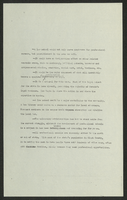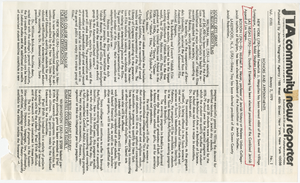Search the Special Collections and Archives Portal
Search Results

Brian Greenspun interview, 2018: transcript
Date
Archival Collection
Description
Interviewed by Barbara Tabach. Publisher of Las Vegas Sun, child of Hank and Barbara Green. Part 1 Subjects: Las Vegas Sun, Greenspun family, Israel gun running; Part 2 subjects: Journalism importance, Las Vegas Sun, Watergate tie-in with Hank's safe, October 1 shootings reflections; Part 3 subjects: Hank and Barabara Greenspun. Talks about Jewish visionaries of Las Vegas that includes Art Marshall, Jack Entratter, Sheldon Adelson, Nate Mack; Part 4: Interviewed by Barbara Tabach. Las Vegas Sun newspaper publisher and native Las Vegan talk about events and people from Las Vegas' years of him growing up. From watching pink smoke from test site to hanging out with friends in the John S. Park neighborhood to racial riot of 1969 to playing golf as a kid.
Text

Transcript of interview with Gil Cohen by Claytee White, August 5, 2014
Date
Archival Collection
Description
Interview with Gil Cohen by Claytee White on August 5, 2015. In this interview, Cohen discusses growing up in Las Vegas and attending University of Nevada at Reno. He returned to Las Vegas to join the management training program at the Stardust. He talks about his friendships with Moe Dalitz and Carl Cohen, and his interest in golfing. He also discusses corporate ownership of casinos, unions, and his experiences working at different Strip hotels.
Gil Cohen came to Las Vegas in 1957, when was ten years old, when his father, Yale Cohen, was recruited by Moe Dalitz to work at the Stardust Hotel and Casino. Cohen graduated from University of Nevada Reno, and started working at the Stardust through the management-training program. In 1975, he was made hotel manager, his first of many leadership positions in Strip properties, which have included the Dunes, Aladdin, Hacienda and Monte Carlo, where he currently works as a casino host.
Text

University of Nevada, Las Vegas law school: questionnaire, press releases, meeting minutes, newspaper clippings
Date
Archival Collection
Description
Folder contains: law school questionnaire and responses, 1973; press release about a statewide advisory board charged with developing preliminary plans for a law school at UNLV, June 20, 1973; Minutes of the Joint Senate-Assembly Education Committee Meeting for a Law School, March 16, 1973; press releases about donations; notes; and newspaper clippings. From the University of Nevada, Las Vegas William S. Boyd School of Law Records (UA-00048).
Text

Gene Noboru Nakanishi oral history interview: transcript
Date
Archival Collection
Description
Oral history interview with Gene Noboru Nakanishi conducted by Ayrton Yamaguchi, Cecilia Winchell, and Stefani Evans on April 2, 2021 for Reflections: The Las Vegas Asian American and Pacific Islander Oral History Project. Gene Nakanishi shares his detailed family history from both his father's and his mother's families. He discusses his paternal grandfather's work on the Union Pacific Railroad, the family's internment in Wyoming during World War II, and his father's release from the camp by joining the United States Army Signal Corps. Nakanishi also talks of his maternal grandfather who was of the Bushido ("warrior") class in Osaka, Japan, and his grandfather's work with Christian missionaries. He shares details of his mother's restaurant employment in Los Angeles and her opening of Osaka Japanese Bistro in Las Vegas in 1969. Nakanishi also talks about being born and raised in Las Vegas, his musical schooling at Berklee College of Music in Boston, and his graduate education at Harvard University. He discusses his work as a band teacher for the Clark County School District, his involvement in the Idyllwild Arts Summer Program band camp, and his interests in jazz music.
Text

Nicole Charlton oral history interview: transcript
Date
Archival Collection
Description
Oral history interview with Nicole Charlton conducted by Barbara Tabach on May 23, 2018 for the Remembering 1 October Oral History Project. In this interview, Charlton discusses her early life in Carlin, Nevada and relocating to Las Vegas, Nevada in 1990. Charlton is the Executive Secretary to the Clark County Coroner John Fudenberg and was among the first from the Coroner's office on the scene of the Route 91 shooting in Las Vegas.
Text

Catherine Cortez Masto oral history interview: transcript
Date
Archival Collection
Description
Oral history interview with Catherine Cortez Masto conducted by Claytee D. White on August 10, 2018 for the Latinx Voices of Southern Nevada Oral History Project. Catherine Cortez Masto grew up in Las Vegas near where the town ended and the desert began, which at that time was near Decatur and Pennwood. She grew up playing in the streets and riding horses and motor bikes with girlfriends and cousins. Her father, Manny Cortez, began as a valet at the Dunes before entering politics. He served 16 years on the County Commission and then 13 years as the chief of the Las Vegas Convention and Visitors Authority. As the head of the LVCVA, Manny oversaw campaigns to increase tourism, enlarge McCarran International Airport, improve taxicab service, and served as a visionary for the entire region. Catherine followed in her father's footsteps while being her own woman and making her own mark on the region. She attended college at UNR and law school at Gonzaga University School of Law. After a clerkship, she worked for a small local Las Vegas firm for 4 - 5 years, then moved to the governor's and then served two terms as Nevada's Attorney General. Currently she's in the US Senate with committee assignments that include Banking, Housing and Urban Affairs; Energy and Natural Resources; Commerce, Science, and Transportation; Rules and Administration; Indian Affairs, and the Committee on Aging. Subjects discussed include: Dunes, Manny Cortez, County Commission, LVCVA, Judge Carl Christensen, Judge Mendoza, Taxi Authority, Tourism, and Mike O'Callaghan.
Text

Transcript of interview with Joy Snyder by Lisa Gioia-Acres, December 17, 2009
Date
Archival Collection
Description
Joy Snyder, born and raised in Pennsylvania, is the daughter of Jean Dasinto and stepdaughter of Ray Hunt. Though she was raised thinking she was an only child, she shares that as an adult, she was contacted by an aunt who gave her information about an Austrian half-sister. The half-sister had tracked the family through WWII records on her biological father! Joy was raised in a very large extended Italian family (her maternal grandmother was first-generation Italian) and became the first in her family to attend college. She had decided early on that she wanted to be a nurse and chose to attend Temple University Hospital in Philadelphia. She recounts memories of her earliest work there, which began the first week of school. After graduation from nursing school, Joy married her childhood sweetheart, William (Bill) Snyder. They made the move to Las Vegas in 1978 and Joy found work right away at Desert Springs Hospital. She worked there about six months and then took maternity leave after the birth of their second son. When she returned to work, it was at Sunrise Hospital (early 1979) in the newborn nursery. Joy comments on many aspects of her career, including the informal approach to health care, the effects of desert climate on mothers and newborns, and the changes she has seen at Sunrise Hospital. She also comments on adoption practices in Las Vegas, drug-addicted babies, and cultural attitudes that appear during the birthing process. Today Joy is retired and her husband Bill is close to retiring. They feel a strong connection to Las Vegas (Bill has a school named after him), but maintain a second home in New York for their trips back East to visit friends and family. They also keep up with various community activities, including book clubs and running clubs for the children at William Snyder Elementary School.
Text

Ashley E. Nitz oral history interview: transcript
Date
Archival Collection
Description
Oral history interview with Ashley Nitz conducted by Claytee D. White on February 6, 2018 for the Remembering 1 October Oral History Project. In this interview, Ashley Nitz discusses her experiences attending the 2017 Route 91 Harvest music festival in Las Vegas, Nevada with a friend. She talks about making the weekend of the event a "staycation", where she stayed with her friend at the Trump Hotel. Nitz goes into detail on the Route 91 Harvest festival venue and the events of that Sunday night when the shooting began. She speaks of the lockdown in the Tropicana Hotel and the support given there to all of the survivors, such as water and medical aid, as well as her journey home once the lockdown was lifted. The interview ends with a discussion on life after the shooting.
Text

Transcript of interview with Judy Lee (Johnson) Jones by Claytee D. White, February 22, 2007
Date
Archival Collection
Description
In the 1950s and 1960s, the Copa Room at the Sands Hotel and Casino featured glamorous showgirls. For a few years, the Houston Chronicle sponsored a contest that added the Texas Copa Girls to the line. In 1958, one of the winners was 17-year-old Judith Lee Johnson. For the "wild" but "naive" Judy, the experience was a period of funfilled freedom, followed by relentless encouragement of others to attend college, which she reluctantly did. To her surprise, she embraced the college life, took her studies seriously, and received an education degree. She also became Miss Houston. Four years later she returned to Las Vegas and the Sands. As she stepped into her role as a showgirl this second time, she was no longer the newbie. She experiences the lifestyle with more maturity. She talks about the celebrities she met, the lasting friendships she formed, performing in the Elvis movie Viva Las Vegas, and her trip around the world, a trip that included her personal dream of going to Paris. Judy shares details of her family heritage and she wonders to what extent she might have been living her mother's dream. Though her love of performance and theatre is keen, Judy channeled her passions into a 29-year career as an educator. She married a Marine in 1965, raised their children, moved with his career. She and her husband, Walter F. Jones, live in Virginia.
Text

